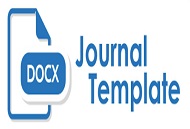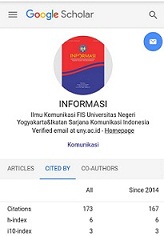- Focus and Scope
- Section Policies
- Peer Review Process
- Publication Frequency
- Open Access Policy
- Archiving
- Publication Fee
- Screening of Plagiarism
Focus and Scope
Informasi is an online, academic journal, free of charge, that adheres to the highest standards of peer review and engages both established and emerging scholars worlwide.
Informasi is an interdisciplinary journal that welcomes contributions coming from and speaking to the many disciplines and approaches that meet at the crossroads that is Communication Studies
Informasi allows authors of a wide range of theoretical and methodological areas in the Communication Studies, from academia to the business-related world, to interact and publish in their own original languages without time-space publishing limitations and accessibility constraints.
Informasi is a journal focused on publishing articles within the extended scientific field of communication and media studies, based on original research and new theoretical propositions.
Its interdisciplinary approach also helps highligting original work coming from other areas within the field of Social Sciences and Humanities that privilege communication, media and journalism as research objects.
The journal is open to English language from all interested authors.
Issues are published in June and December.
In terms of its editorial logic, Informasi pursues high scientific standards, pluralism and social relevance, looking for contributions that foster new and original scientific knowledge.
Section Policies
Editorial
Articles
Peer Review Process
The peer review process aims to ensure that high quality manuscripts relevant to the topics of the journal are published. All manuscripts submitted to the journal are peer reviewed following the procedure outlined below
Administrative submission evaluation
All submissions are checked by the Journal Administrator to ensure that they conform to the paper requirements outlined on the author information page of the journal website. Issues such as paper length, standard of the English language, format of diagrams, referencing style, etc. are considered. If the submission does not meet all or some of these criteria the submission will be declined, and the authors asked to resubmit after addressing the issues.
Initial Editorial evaluation
Chief Editors evaluates all submitted manuscripts. A manuscript can be rejected at this stage due to not being insufficiently original, having serious scientific flaws, having poor language, or for being outside the aims and scope of the journal. Manuscripts that meet the minimum criteria are either managed by the Chief Editor or passed to an Associate Editor to manage the peer review process.
Authors of manuscripts rejected at this stage will usually be informed within one month of receipt.
Double-Blind Peer Review
The Journal adopts ‘double blind’ peer reviewing. This means the reviewers remain anonymous to the author(s) throughout and following the review process, and the identity of the author(s) is also unknown to the reviewers.
Selecting a Reviewer
Whenever possible, reviewers are matched to the paper according to their expertise, details of which are held on our reviewer database.
Reviewer reports
Reviewers are asked to evaluate whether the manuscript:
- Is original as to thought and method (including data)
- Is methodologically sound
- Has results which are clearly presented and support the conclusions
- Correctly and extensively references previous relevant work
- Follows appropriate ethical guidelines, especially as concerns plagiarism
- Clearly adds to the knowledge and development of the field
Language correction is not part of the peer review process, but reviewers are encouraged to suggest corrections of language and style to the manuscript, or to suggest whether the manuscript requires proof reading. In the final round, the handling Editor will check matters of linguistic and stylistic accuracy and may suggest or apply corrections at this point. In some cases, the manuscript may be returned to the author(s) for a full linguistic and stylistic revision.
How long does the review process take?
The time required for the review process is dependent on the response of the reviewers. The typical time for the first round of the review process is approximately 6 weeks, with a maximum of three months. Should the two reviewer’s evaluations contradict one another, or a review is unnecessarily delayed, a further expert opinion may be sought. In rare cases when it is extremely difficult to find a second suitably experienced individual to review a manuscript, and the one report received has thoroughly convinced the handling Editor, a decision to accept, reject or ask the author for revisions may be made, at the handling Editor’s discretion, on the basis of only one review. The handling Editor’s decision will be sent to the author with the reviewer recommendations, usually including the latter’s verbatim comments. As a rule, revised manuscripts are sent to the initial reviewers for checking, who may then request further revision or recommend a reject if it is felt that insufficient changes have been made to the manuscript.
The Chief Editor's decision is final
Reviewers advise the Chief Editor, who is responsible for the final decision to accept or reject the article.
Publication Frequency
Publication on June and December
Open Access Policy
This journal provides immediate open access to its content on the principle that making research freely available to the public supports a greater global exchange of knowledge.
Archiving
This journal utilizes the LOCKSS system to create a distributed archiving system among participating libraries and permits those libraries to create permanent archives of the journal for purposes of preservation and restoration. More...
Publication Fee
Informasi Journal does not charge APCs, submission charges, or other fee. All processes of article publication are free of charge.
Screening of Plagiarism
Scanning of plagiarism on the manuscripts will be conducted by using Turnitin software, provided by Yogyakarta State University.














